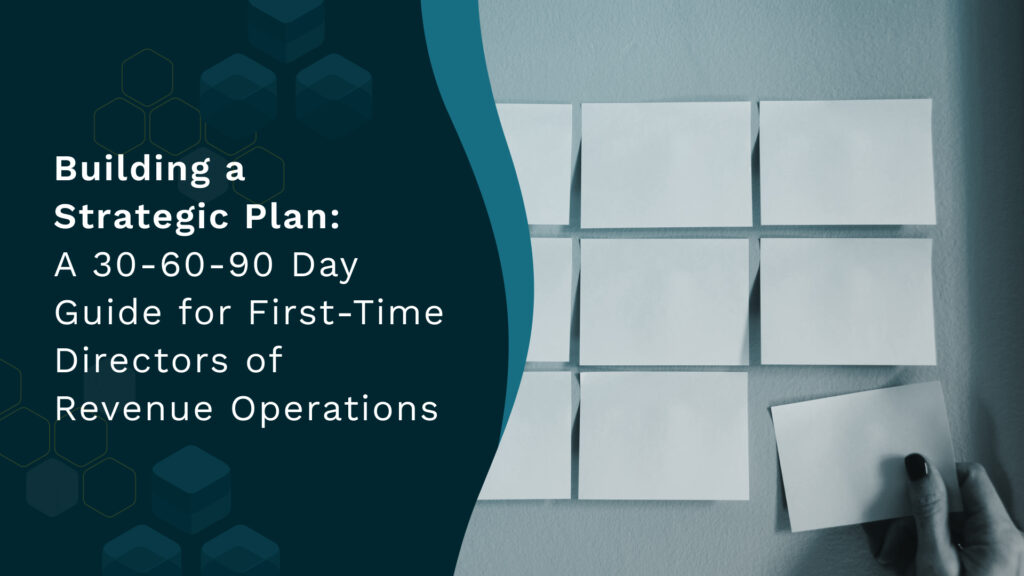
Top 10 Sales Methodologies to Use in 2025
Discover the top 10 sales methodologies for 2025, including Solution Selling, SPIN Selling, Challenger Sale, and more, to boost your sales strategy.
Every business out there is trying to sell something, whether it’s tangible products, services, knowledge, or software.
But the real question is – are they keeping up with the changing trends in customer buying patterns?
Customers have become wiser, and their preferences & behavior have evolved with time. To cement this statement, today, 67% of customers now prefer self-service over speaking to a company representative.
As a result, businesses must tailor their sales methods to meet such changing needs.
It’s not enough to just sell something; they need to do it in a way that resonates with the customer and meets their expectations.
Businesses often struggle to do just this without a structured and strategic approach.
After-effects? Poor sales results and low adoption.
Implementing the right sales methodology can help you stay on track and focus on the customer journey. But there are many sales methodologies out there that can be confusing. Which is why we have created this exclusive guide for you.
Know better to sell better! Check how Nektar helps you take control of your sales funnel.
In this article, we will walk you through the basics of sales methodologies and the top 10 sales methodologies to use for selling to the modern customer of today. Keep reading!
What is a Sales Methodology?
Sales methodologies are a systematic and strategic approach to the sales process. They involve a set of principles and practices that guide sales teams in their interactions with customers. The ultimate goal is to gain a better understanding of customers’ needs, foster trust, and ultimately increase the chances of closing more deals.
The history of sales methodologies dates back to the early 20th century when sales techniques were mainly focused on personal persuasion and hard-selling tactics. However, in the 1950s, the concept of consultative selling emerged, which prioritized building relationships with customers and understanding their needs. This approach got popular in the book “Spin Selling” by Neil Rackham in the late 1980s.
Since then, many sales methodologies have emerged, each with its unique features and benefits. Some of the most popular sales methodologies include the Challenger Sale, Solution Selling, MEDDIC, SPIN Selling, and Value Selling, among others.
But, how are these methodologies different from the sales process? That’s what the next section is about.

Sales Methodology vs Sales Process
Sales methodology is a framework that guides salespeople in their approach to selling, with the aim of understanding customer needs, fostering trust, and winning more deals. It includes principles and practices that inform the sales team’s overall strategy for selling, such as
- how to approach customers,
- how to position products or services,
- how to handle objections and more.
On the other hand, a sales process is a series of steps that a sales team takes to move a potential customer from initial contact to closing a sale. The process typically includes stages such as
- prospecting,
- lead qualification,
- needs assessment, presentation, and demonstration,
- negotiation, and closing.
This process can be mapped out in a flowchart or diagram.
To be precise, sales methodology is an overarching philosophy to sell while the sales process outlines the specific steps that reps need to follow for carrying out that sales methodology.
Advantages of Sales Methodologies
Sales methodologies can greatly help a business and fuel its sales efforts in more ways than one.
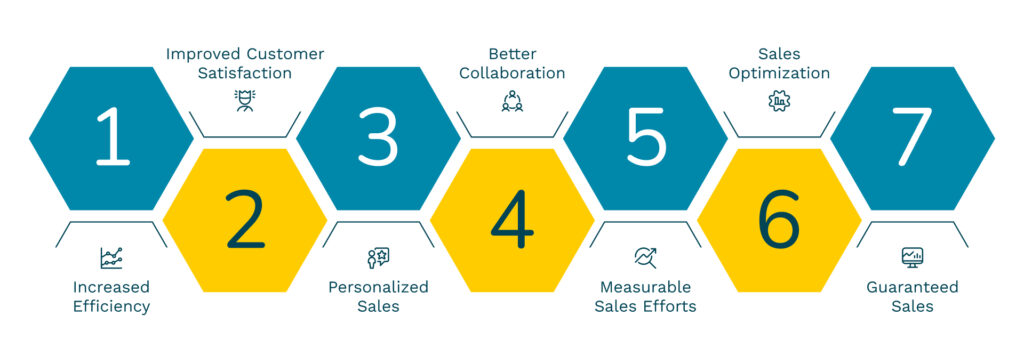
1. Increased efficiency
It provides a structured approach to selling, helping salespeople to be more organized and efficient in their work.
2. Improved customer satisfaction
It helps to build trust with customers by focusing on understanding their needs and pain points.
3. Personalized sales
It enables salespeople to tailor their approach to different customers, based on their unique buying motivations and preferences.
4. Better collaboration
It facilitates teamwork among sales team members, who can work together more effectively when they are all following the same methodology.
5. Measurable sales efforts
It makes it easier to track progress and measure success, as each step of the sales process is clearly defined and measurable.
6. Sales optimization
It helps to identify areas for improvement, as businesses can analyze their sales data to see which parts of the methodology are working well and which need to be adjusted.
7. Guaranteed sales
It leads to better sales results as salespeople are equipped with a proven approach to selling that has been shown to be successful in similar situations.
This is not it! Having sales methodologies in place has immense benefits and it is more like having a map in the jungle. It helps your sales teams navigate through the complex and often unpredictable sales landscape.
With a well-defined methodology, they can stay on the path toward achieving their sales goals and ultimately, closing more deals and bringing more money into your business.
How to Choose the Best Sales Methodology for your Business
As an industry, we cling to this incorrect notion that there’s a single best way to sell. We select a sales process or methodology that we believe is a “best practice,’ and we tell our sellers to repeat that same sales approach with every customer in every circumstance. It’s a fundamentally flawed strategy .
Dr. Leff Bonney, Marketing Professor
When it comes to selecting the right sales methodology for your business, there are a few key things that you simply shouldn’t ignore. It’s essential to take the time to carefully consider these factors and not rush into a decision without proper evaluation.
1. Needs of your target audience
Your customers’ needs, preferences, and buying habits should be at the center of your decision of selecting a sales methodology.
For instance, if your customers tend to do their own research and make decisions independently, a self-service approach like Value Selling Framework could be a good choice. On the other hand, if your customers prefer a more interactive approach, a hands-on technique like Spin Selling might be a better fit.
2. Sales cycle & complexity
The duration and complexity of the sales process can be different for every business. It depends on a few factors like what you’re selling, how the decision-making works, and how many people are involved in making the final decision.
If you’re dealing with a sales cycle that requires lots of touchpoints and is pretty lengthy, you might want to use a methodology like N.E.A.T Selling or The Challenger Sale.
3. Product/Service
The type of product or service you’re selling can really impact the kind of sales methodology you should use. If you’re dealing with a complex offering that requires a lot of explanation, you might want to think about using a methodology like Conceptual Selling.
On the other hand, if you’ve got a product or service that’s easy to understand and has a short sales cycle, you might want to try out something like SNAP Selling. Either way, it’s important to choose a sales methodology that aligns with the unique characteristics of your business.
4. Business goals
When selecting a sales methodology, the business goals should be kept in mind. If you’re looking to grow your market share and get new customers, you might want to explore methods like Target Account Selling (TAS) or The Challenger Sale.
But if you’re focused on creating loyalty and relationships with your existing clients, you might want to try out something like the Value Selling Framework. At the end of the day, the sales methodology you choose should align with business objectives and help you achieve and exceed the benchmarks you have set.
5. Sales team
Your sales team’s skills, strengths, and weaknesses should also be taken into account when selecting a sales methodology.
If your team has skilled relationship builders, a methodology like Inbound Selling may be a good fit. Alternatively, if your team comprises subject matter experts, a methodology like MEDDIC Sales may be more suitable.
6. Industry trends
Keeping pace with industry trends can be helpful when selecting the right sales methodology. If your industry is shifting towards a more inbound marketing and sales approach, Inbound Selling might just be the right choice.
If new players are entering your industry every now and then, then you may want to consider a methodology like The Challenger Sale, which focuses on differentiation and adding value to customers.
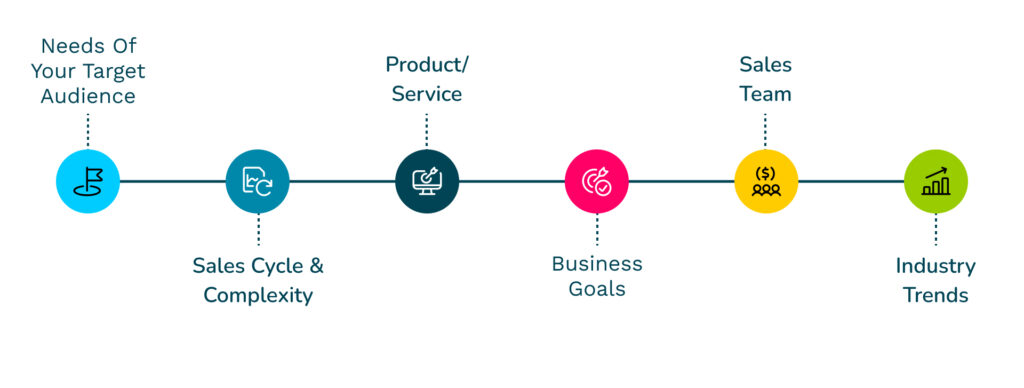
Top 10 Sales Methodologies to Use in 2025
Now that we have a good understanding of sales methodologies, let’s jump right into exploring some of the most popular ones you can implement.
1. SPIN Selling
SPIN selling is a proven sales methodology to boost your conversion rates developed by Neil Rackham in 1988, focusing on diagnosing the customer’s problem before attempting to sell anything.
By asking targeted questions at the right time, sales reps can identify common themes and issues that a customer is facing, position their product as the ideal solution, and close the deal.
Instead of following a rigid script for every sales conversation, the SPIN model teaches reps to ask situational “SPIN” questions to move their prospects through the sales funnel.
The SPIN model consists of four key areas that form the basis of its acronym:
- Situation: Questions about the prospect’s processes, tools, objectives, and responsibilities to learn about their fundamental goals.
- Problem: Questions about the challenges the prospect is currently facing to address their exact needs.
- Implication: Questions about uncovering problems that might occur when a solution is not used, creating a sense of urgency for solving them.
- Need payoff: Questions about potential solutions to reveal how the product will benefit the prospect’s organization should be presented to key stakeholders & decision-makers.
Best used when your sales cycles are long and require multiple touchpoints with decision-makers.
2. N.E.A.T Selling
NEAT selling is more than just a sales methodology, it starts from identifying potential leads and determining which ones are most likely to result in successful sales. This method makes sure that sales reps are targeting the right audience.
The four key areas of NEAT are:
- Need: This involves understanding the prospect’s pain points that need to be solved
- Economic impact: Focusing on the financial benefits the prospect can gain from finding a solution to their problem
- Access to Authority: Identifying the decision-makers and finding ways to connect with them
- Timeline: Figuring a realistic timeline for completing the sale and implementation of the product
Even the research says that need and budget are the two biggest factors in whether a prospect connects with a rep.
Best used when businesses have a complex sales process, where multiple stakeholders are involved in the decision-making process and you have a high-value product or service.
3. SNAP Selling
The sales methodology called SNAP Selling was developed by Jill Konrath, a sales strategist and keynote speaker. SNAP stands for four key elements that the methodology focuses on:
- Keeping the message Simple
- Becoming an iNvaluable resource for your prospects
- Align the solution to the prospect’s needs
- Prioritizing the efforts on the most promising prospects
The idea behind SNAP Selling is to help salespeople sell to today’s crazy-busy prospects who are easily overwhelmed and have limited time and attention spans.
Best used when selling complex solutions that involve a longer sales cycle and a high level of customization due to the presence of more competitors.
4. The Challenger Sale
The Challenger Sale is a sales methodology that focuses on challenging the customer’s status quo and pushing them outside their comfort zone to think about new and innovative solutions to their business problems. Besides, 40% of the top sales performers use this methodology.
The key element of the challenger sale includes the three Ts which are:
- Teaching: Providing insights and educating customers on new and better ways to address their challenges
- Tailoring: Customizing the solution to the customer’s specific needs and providing a unique value proposition
- Taking control: Leading the conversation and guiding the customer through the sales process
Best used when a business is selling complex solutions or customers are using obsolete solutions. Can be used by businesses trying to differentiate themselves from the competition.
Discover the granular insights your sales team needs to win more deals!
5. MEDDIC
MEDDIC sales methodology emerged in the 1990s. This method emphasizes the need for precise measurements and control over the sales funnel to determine the value of investing time with a prospect.
The term MEDDIC implies
- Metrics: Determine the prospect’s primary goal in working with your company
- Economic buyer: Identify the decision-maker at the company you’re negotiating with
- Decision criteria: Learn about the decision-making factors and criteria used by the prospect
- Decision process: Understand the decision-making process, sign-offs required, and timelines involved
- Identify the pain points: Discover problems that your product can solve and the consequences of not using your product
- Champion: Find a champion within the target company who will benefit the most from your offering
MEDDIC is a sales method that helps in determining the areas where your sales team needs to focus their time and effort while out there selling.
By using MEDDIC, the company PTC which also created this very methodology grew from tripling its sales from $300 million to $1 billion in just four years. Already thinking about using it?
Best used when a business has a longer sales cycle, involve multiple stakeholders, and has a high price point.
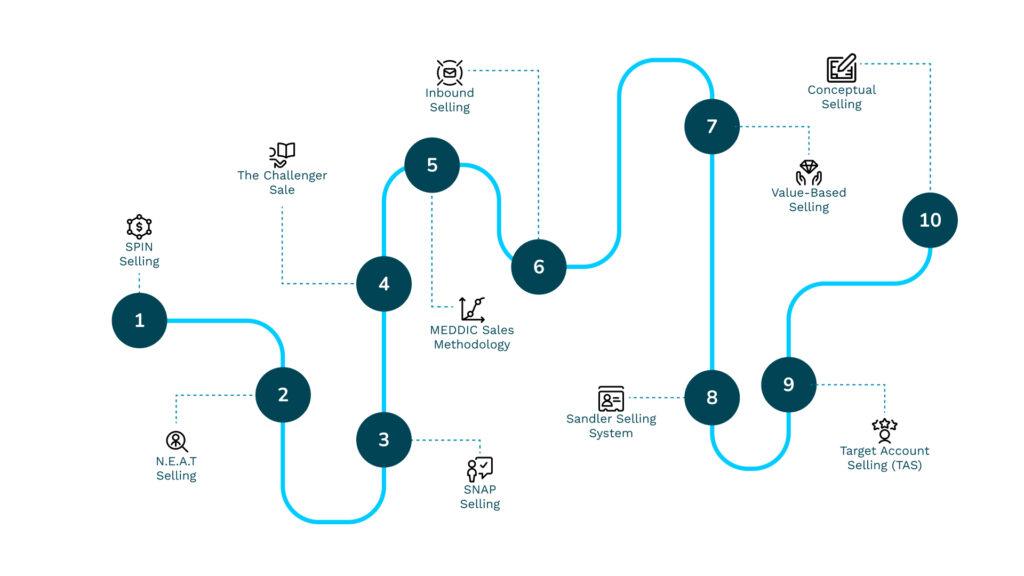
6. Inbound Selling
Sales and marketing goals are becoming more closely intertwined with potential buyers purchasing decisions. In fact, B2B buyers engage with at least 13 pieces of marketing content and research products before reaching out to sales teams.
Inbound sales methodology allows sales reps to connect with prospects where they are, such as on social media or a company’s product pricing page.
By analyzing page views, conversions, and social media interactions, inbound sales reps personalize the buying experience, following a flywheel model instead of a traditional sales funnel.
Best used when a company has a strong online presence and marketing strategy, diverse prospects, and a product/service that requires personalized attention for selling.
7. Value-based Selling
Value-based selling is a sales methodology that focuses on highlighting the value a product/ service can provide to a customer.
This approach requires sales reps to identify the unique needs and pain points of each prospect, demonstrate how their offering can address those needs, and quantify the value in terms that resonate with the prospect.
As a matter of fact, 87% of high-growth sales organizations take the approach of value-based selling because it creates value for their customers.
It has 7 key principles:
- Do your research and understand customer needs and preferences.
- Don’t lead with your sales pitch but focus on building relationships first.
- Ask questions and listen to their problems
- Let them know the value/ROI of your offering.
- Teach, don’t pitch. Educate customers on solutions.
- Focus on the buying process, not the selling process
- Be genuine and build trust with customers.
Best used when the sales cycle is complex and involves multiple stakeholders. Also, suitable for a business operating in a saturated market.
8. Sandler Selling System
A whopping 88% of the sales reps said that their sales strategy improved by using this methodology. Let us see what the fuss is about.
The Sandler Selling System is a sales methodology that was developed by David Sandler in the late 1960s. It is a consultative and low-pressure approach to selling that emphasizes the salesperson’s control over the discovery process.
The methodology has seven steps that include
- Build rapport and connection with the prospect
- Agree on a contract before beginning the sales process
- Identify the pain points or challenges of the prospect
- Uncover their budget constraints and limitations
- Determine who makes the final decision in the buying process
- Present your solution as a fulfillment of the prospect’s needs
- Confirm the post-sale process to ensure customer satisfaction
The goal of the Sandler Selling System is to create a mutually beneficial and long-term relationship between the salesperson and the prospect.
Best used when businesses have a longer sales cycle, complex sales processes, and offer high-ticket products/services.
9. Target Account Selling (TAS)
Target Account Selling (TAS) is a B2B sales methodology that focuses on identifying and targeting high-value accounts, or “whale” accounts, in order to close larger deals and generate more revenue.
Four stages of TAS methodology include:
- Identify: Identify the ideal target accounts based on specific criteria such as revenue potential.
- Discover: Gather intelligence and insights about the target accounts.
- Engage: Develop and execute a tailored engagement plan that addresses the needs and challenges of the target accounts.
- Close: Close the deal by demonstrating the unique value proposition of your offering.
Data and intelligence are the core of any account-based sales methodology. How do you collect the right data? (more on that later)
Best used when a business has a high-value product/ service that requires a long sales cycle, involves multiple decision-makers, and has a strong understanding of its target market.
10. Conceptual Selling
The approach of Conceptual selling is based on the concept that customers are not buying a product or service, but instead, they are buying the idea of a solution that the offering represents.
This approach suggests that salespeople should not begin with a pitch, but rather explore the prospect’s idea of their product and understand their decision-making process.
To accomplish this, they propose that salespeople ask questions that fall into five categories:
- Confirmation questions reaffirm information
- New information questions clarify the prospect’s concept
- Attitude questions seek to understand a prospect personally
- Commitment questions inquire after a prospect’s investment
- Basic issue questions to identify any potential issues
Best used when the product/service being sold is complex and the sales cycle is long involving multiple stakeholders. Suitable for SaaS and subscription-based businesses.
We are at the final step of implementing a sales methodology. Let’s deep dive into the execution part.

How Can you Implement Sales Methodologies?
According to a report, almost 60% of the respondents reported that the sales methodologies they have implemented have provided a return on investment that exceeded their costs.
It is clear that implementing a sales methodology can yield glamorous returns, It is also clear that choosing one for your team is not as simple as making a random guess. You need to put in a lot of work to choose the right methodology based on the factors mentioned earlier.
But once you’ve done all the hard work and selected one for your business, what’s next?
Well, here are some steps to help you effectively implement the methodology:
1. Understand your target audience
Start by studying your target market, their needs, and their pain points. Figure out the specific challenges that they face and what actually drives their purchasing decisions.
2. Evaluate your team’s strengths and weaknesses
Identify the strengths and weaknesses of your sales team. Determine the areas where they win and where they need improvement. This can help you choose a methodology that aligns with your team’s strengths and help them poot their best foot forward.
3. Consider your industry
Different industries have different sales cycles, customer behaviors, and buying patterns. Choose a methodology that is proven to work in your industry.
4. Align with your business model
Take into account whether the sales methodology is right for your business model. For instance, if you are in a SaaS business, you must opt for a methodology that prioritizes building long-term relationships with customers.
5. Talk to experts
Consult with experts in your industry or with sales consultants to get their input on which methodology might work best for your business.
6. Test and iterate
Once you have chosen a methodology, test it out and monitor its effectiveness. Iterate and refine the methodology as needed based on the results you see.
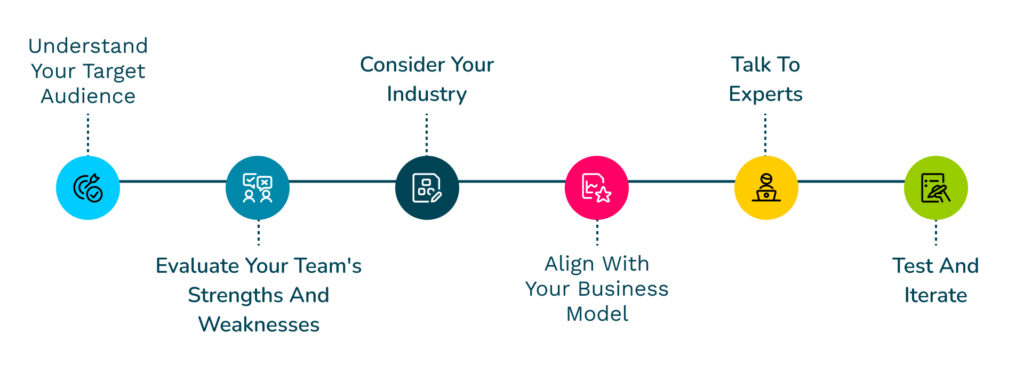
Conclusion
No matter which sales methodology you use, it’s important to be armed with data and intelligence to make them work. That’s where Nektar comes in.
Nektar is an AI for RevOps platform that focuses on the actions that reps need to take to drive more revenue.
Talk to one of our experts to learn more.
Check the gaps in your CRM, with an no-obligation free CRM scan report.
PUBLISHED BY
